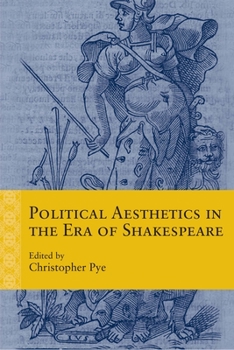Political Aesthetics in the Era of Shakespeare
(Part of the Rethinking the Early Modern Series)
The turn to political concerns in Renaissance studies, beginning in the 1980s, was dictated by forms of cultural materialism that staked their claims against the aesthetic dimension of the work. Recently, however, the more robustly political conception of the aesthetic formulated by theorists such as Theodor Adorno and Jacques Ranci re has revitalized literary analysis generally and early modern studies in particular. For these theorists, aesthetics forms the crucial link between politics and the most fundamental phenomenological organization of the world, what Ranci re terms the "distribution of the sensible." Taking up this expansive conception of aesthetics, Political Aesthetics in the Era of Shakespeare suggests that the political stakes of the literary work--and Shakespeare's work in particular--extend from the most intimate dimensions of affective response to the problem of the grounds of political society. The approaches to aesthetic thought included in this volume explore the intersections between the literary work and the full range of concerns animating the field today: political philosophy, affect theory, and ecocritical analysis of environs and habitus.
Format:Paperback
Language:English
ISBN:0810142171
ISBN13:9780810142176
Release Date:June 2020
Publisher:Northwestern University Press
Length:296 Pages
Weight:0.90 lbs.
Dimensions:0.8" x 6.0" x 9.0"
Customer Reviews
0 rating





